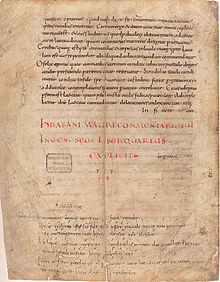Peter's song
The Petruslied is the oldest known German and Old High German sacred song from the end of the 9th to the beginning of the 10th century. It is a petition for times of need, pilgrimages and processions in the old Bavarian language. The song is anonymous and only survived in a manuscript from Freising ( BSB Munich , Clm 6260, fol. 158 v ). It was entered as an addendum on the last page of the manuscript, which was created around 870 and contains a copy of the Genesis Commentary by Hrabanus Maurus .
Text and reception
The song comprises three stanzas, which are composed of two long lines rhymed inside . The verses are set off and the verses separated by periods, also the verses are with the notation system of neumes provided. The stanzas are followed by “ Kyrie eleison ” as a refrain .
The Petruslied is close to the Latin Petrushymnik. It shows clear similarities with the processional chant "Aurea luce et decore roseo". This kind of pilgrimage song is attributed to the Peter Song, further is "Kyrie eleison" by the phrase of the iron associate.
The basis for the Peter song is a scene from the Gospel of Matthew ( Mt 16,18 LUT ), in which Jesus Christ hands over the " keys of the kingdom of heaven " to the apostle Peter so that Peter can open or close the door of heaven according to medieval theology. Hence the third stanza of the song of Peter finds its climax and conclusion with a request to Peter: He may impart divine grace to the sinful believers - "us". The request “that he us firtanen giuuerdo ginaden” can also be found in Otfrid von Weißenburg's Gospel Harmony ( Liber evangeliorum 1, 7, 28) in the form “that he us firdanen giwerdo ginadon”. It is unclear whether the anonymous scribe or Otfrid quotes the other; A possible joint template is also not yet available.
|
|
See also
literature
facsimile
- Erich Petzet (Ed.): German tablets of the IX. to XVI. Century from manuscripts of the K. Court and State Library in Munich. Old High German written monuments of the IX. to XI. Century. Kuhn, Munich 1910. ( digitized version of the University and State Library Düsseldorf )
Research literature
- Wilhelm Braune : Old High German Reader. 17th edition edited by Ernst Albrecht Ebbinghaus , Niemeyer, Tübingen 1994, ISBN 3-484-10708-1 , pp. 131, 177. (Google book search retrievals after 16th edition edited by EA Ebbinghaus)
- Gustav Ehrismann : The old high German literature. Unchanged reprint of the 2nd, fully worked out edition 1932, Munich, CH Beck 1962, pp. 203–207. ( History of German literature up to the end of the Middle Ages; Vol. 1)
- Bruno Jahn: Petruslied. In: Wolfgang Achnitz (Hrsg.): German Literature Lexicon: The Middle Ages. Volume I. The spiritual literature from the beginning to the beginning of the 14th century. de Gruyter, Berlin / New York 2011, ISBN 978-3-598-24991-4 , Sp. 135-139.
- Elias von Steinmeyer : The smaller Old High German language monuments. Weidmannsche Buchhandlung, Berlin 1916, pp. 103-104.
Web links
- Petruslied: high-resolution digital version in the culture portal bavarikon
- University of Tübingen, German Seminar: Photo of the handwriting foil and sound file.
- The Peter song in the Bibliotheca Augustana
- Bibliotheca Augustana: Detailed photo of the Peter song
- Entry of the Petruslied in the manuscript census of the Paderborn repertory of the German-language text transmission from the 8th to 12th centuries
- Digital copy of the Hss. Clm 6260, fol. 158 verso (BSB Digital Library - Munich Digitization Center)
Individual evidence
- ↑ For the Old High German field of meaning of things see Grimm's dictionary .
